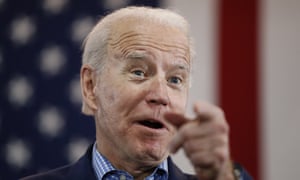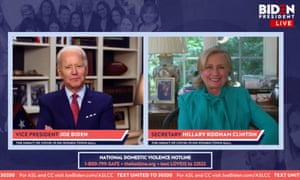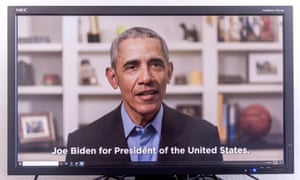Biden’s lead over Trump widens – but strain on his virtual campaign grows
Coronavirus has robbed the Democrat of his typical back-slapping approach as he faces growing scrutiny and a third-party challenge

Photograph: John Locher/AP
The Tampa, Florida, rally for Joe Biden on Thursday evening began as it normally might have, before a once-in-a-century pandemic transformed all aspects of American life, including the presidential campaign. A local high school student recited the pledge of allegiance, a campaign organizer pleaded with supporters to volunteer and a local DJ spun R&B music between speakers.
But in a sign of how profoundly the coronavirus crisis has reshaped American politics, that was where the similarities ended.
With much of the US still in lockdown, the presumptive Democratic presidential nominee has been forced to take his campaign to unseat Donald Trump online. It has not always been easy.
His campaign’s first attempt to recreate a traditional rally – part of a virtual swing through the battleground state of Florida – was later described by his opponents as an “unmitigated technological failure”. The video stream was glitchy and pixelated. The audio was choppy, rendering some remarks nearly incomprehensible. And there were lengthy delays between speakers and at one point, the feed went dark for several minutes.
“Am I on?” asked Biden, beaming into the telecast from his home in Wilmington, Delaware, where he has been isolated since the middle of March. An off-camera voice replied that he was. Biden removed a pair of aviator sunglasses as he walked toward the camera.
“Good evening, Tampa. Thanks so much for tuning in,” he continued, a hint of irritation in his voice. “I wish we could have done this together – and it had gone a little more smoothly.”
For nearly two months, Biden has been the test subject in a novel political experiment: running for president in the age of Covid-19.
Social distancing restrictions imposed to stop the spread of the virus have already starved the campaign of a victory tour to mark his ascent to the Democratic nomination. It may well deny Democrats the chance to formally nominate him in person at the party’s national convention this summer. Endorsements from former rivals and party leaders occur online to varying degrees of fanfare. . The remote set-up, anathema to Biden’s back-slapping, glad-handing approach to politics, has left the candidate walled off from voters and competing for visibility.
Yet, technical difficulties aside, his campaign of confinement seems to be working.

In recent weeks, Biden has widened his lead over Trump as the president’s support slips amid growing disapproval of his response to the pandemic. Surveys from Pennsylvania, Michigan, Wisconsin, Florida, North Carolina and Arizona – key battlegrounds that Trump won in 2016 – show Biden ahead. At a recent virtual fundraiser last week, Jennifer O’Malley Dillon, his new campaign manager, expressed optimism about Biden’s prospects in Florida and Arizona.
“The natural state of this race is to be a referendum on Donald Trump and every time Donald Trump steps to the microphone he hurts himself,” said Mark Mellman, a veteran Democratic pollster. “That’s a pretty good position for Joe Biden to be in.”
Biden initially struggled to adapt to his cloistered reality. In March, the campaign turned a recreation room in the basement of his home into a studio, though not fast enough for his critics, who launched a “Where’s Joe” campaign to mark the candidate’s relative disappearance from the national stage.
But since then, Biden has been busy. Nearly every day he makes appearances on local TV news channels or national talkshows. He launched a podcast, where he has hosted conversations with prominent Democratic governors and potential vice-presidential candidates. He spends time each day speaking with a voter – a frontline worker, campaign volunteers – and he participated in what the campaign billed as a “virtual rope line”.
“So what’s up?” he said to Ashley Ruiz of Fort Lauderdale, Florida, one of several voters on the rope line. “Tell me about your situation, Ash.”
•••
Biden’s rise in the polls comes as he contends with an allegation from Tara Reade, a former aide in his Senate office who accused him of sexual assault in 1993. In an interview this week with Megyn Kelly, the former Fox News and NBC television host, Reade said he should withdraw from the presidential race.
Biden has forcefully denied the allegation. “It’s not true, I am saying unequivocally. It never, never happened,” he said last week, in an interview addressing her claim for the first time publicly.
Publicly, Democrats, including prominent #MeToo advocates, have rallied around Biden, though privately some in the party have expressed concern about the continuous drip of reporting on the matter.
So far the allegation appears to have marginally dented his reputation, but not his lead. Most voters – 86% – are aware of the allegation, according to a Monmouth poll, which found the electorate divided over whether they viewed the claim as credible. At the same time, the poll showed Biden nine points ahead of Trump.
Despite Trump’s falling electoral fortunes, many Democrats remain anxious about Biden’s position – and his strategy.
David Axelrod and David Plouffe, two of Barack Obama’s top campaign strategists, implored Biden’s campaign to expand its digital footprint in a joint New York Times op-ed that compared the atmospherics of the candidate’s home videos to “an astronaut beaming back to earth from the International Space Station”.
“Online speeches from his basement won’t cut it,” they wrote.
Lis Smith, the former top adviser to Pete Buttigieg’s presidential campaign, followed with an op-ed on Thursday that offered a blueprint for turning Biden into the “hottest bad boy and disrupter in the media game”. She suggested his campaign use TV appearances and digital content to highlight Biden’s empathy, a trait even supporters say the president has lacked in response to the rising coronavirus death toll.
Part of the campaign’s evolving digital strategy includes partnering with groups that already have an online presence, like JoeMamas2020, a national coalition of “moms, caregivers, moms to be, aunts & all the parental figures in between” with about 27,000 Facebook and 1,200 Twitter followers. The group has helped amplify Biden’s appearances and policy proposals while spreading the word about upcoming events.
Julie Zebrak, the group’s co-founder, said the online army is growing with women energized to help elect a candidate who would end the Twitter presidency.
“We are all extremely enthusiastic for Joe Biden to beat Donald Trump,” she said.
Yet the same traits that endear Biden to a growing coalition of suburban women and Never Trump Republicans have largely failed to excite younger, progressive voters. It’s not that they prefer Trump – they don’t – but a lack of enthusiasm among those voters could spell trouble in November if they stay home or vote for a third-party candidate.
The campaign has also ramped up its outreach to young people, who overwhelmingly supported Biden’s rival Bernie Sanders. On Friday, Biden presented his economic pitch in an appearance on NowThis, a social-media-heavy news outlet with a young, progressive audience.
“This crisis hit harder and will last longer because Donald Trump spent the last three years undermining the core pillars of our economic strength,” Biden said in remarks that attacked Trump’s stimulus efforts a kind of “cronyism” and corporate welfare. Before he began speaking, Biden removed a face mask, a pointed rebuke of the president who had refused to wear one.
Still, new research conducted on behalf of NextGen America found many young people weren’t convinced Biden’s policies meet the scale of the challenges bearing down on their generation.
This makes the efforts of groups like Progressive Turnout Project, which endorsed him this week, all the more important. In the coming months, the group is investing more than $52m to turn out low-propensity Democratic voters – including young people and people of color – in 17 key battleground states.
“The best thing we can do is go and knock on doors and have face-to-face conversations with voters,” said Alex Morgan, the group’s executive director. “We are still looking to do that. But it’ll be knocking on that door and then taking a few big steps back and having a more distant conversation.”
•••
Biden’s campaign also faces another looming threat. The Michigan congressman Justin Amash, who left the Republican party last year after voting to impeach Trump, recently announced that he would seek the Libertarian party nomination.
His entrance has alarmed Democrats, who fear he could siphon off Never Trump voters who might otherwise back Biden, particularly in Amash’s home state of Michigan, where third-party candidates pulled away a combined 5% of the vote share in 2016. Hillary Clinton lost the state by just 10,704 votes, less than 0.25%.

Many Democrats believe Biden’s fate may well rest on his ability to persuade their own side to vote.
“Trump has shown no desire or ability to moderate for those swing voters in this election,” said Addisu Demissie, who served as Cory Booker’s presidential campaign manager. “So those voters are now likely going to end up either Biden voters or non-voters or third-party voters, and that’s the competition.”
This week, Trump traveled to the battleground state of Arizona, where he toured a medical mask facility without wearing one himself. The visit was a symbolic show of his administration’s push to reopen the US economy but there were unmistakable elements of his signature campaign rallies, including the music that played when Trump finished his remarks (the Rolling Stones’ You Can’t Always Get What You Want).
Trump’s cross-country venture stood in striking contrast to Biden’s virtual swing through Florida – which included a rally, a roundtable in Jacksonville and an appearance on the local news in Tampa. The technical glitches only further highlighted the limitations of his confinement.
But the coronavirus has also upended Trump’s strategy, erasing the booming economy he has made a centerpiece of his re-election campaign. In recent weeks, his campaign has all but abandoned championing the president’s leadership, instead focusing its efforts on diminishing Biden.
Trump’s campaign manager, Brad Parscale, previewed the onslaught on Twitter this week, comparing the Trump re-election juggernaut to the Death Star from the Star Wars movies. “In a few days we start pressing FIRE for the first time,” he wrote.
As Trump prepares to make even greater use of the advantages of incumbency, Biden faces his biggest test yet. Can he really lead a Rebel Alliance from his basement?




